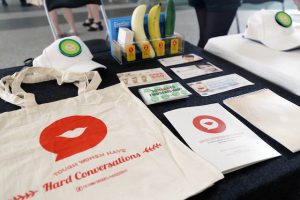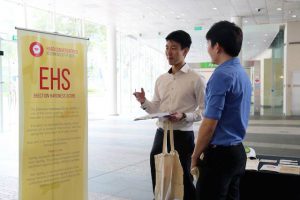A hard conversation with women
Erectile dysfunction may affect men, but it also affects their partners. Four NTU students are focusing on bringing awareness to women.
Erectile dysfunction (ED) affects not just men … it also affects their partners. As such, four undergraduates of the Wee Kim Wee School of Communication and Information at Nanyang Technological University (NTU) have come up with a campaign as part of their final-year project called Hard Conversations where it is targeting women on this topic. Their campaign includes a brochure which touches on myths and misconceptions, causes of ED, and identifying ED; a February dialogue session with an expert panel of urologists and sexologist; and public roadshows.
Shared the students in their campaign brochure: “ED is becoming increasingly prevalent, yet remains largely ignored by society. We believe that conversation is a healthy way to help couples protect themselves. This is one of the first steps in breaking the silence and helping ladies learn about the truth behind this medical condition.”
ED, which is “the inability to achieve and/or maintain a penile erection sufficient for satisfactory sexual activity”, is the most common male sexual concern today and by 2025, it will affect 325 million men worldwide. Though the prevalence increases, as one gets older for example when they reach 75 years and older, doctors are also seeing younger patients.
Dr Peter Lim, medical director of Andrology, Urology & Continence Centre at Gleneagles Hospital, said in the campaign brochure that men with ED tend to lose confidence in succeeding in all areas of life – in his career, interpersonal relationships, and romantic relationships. Furthermore, ED is often a sign of underlying illnesses such as cardiovascular diseases, or diabetes. Men with ED lasting three to six months are recommended to have a thorough medical evaluation to identify possible medical causes.
Women think they are to blame
Women often think they are to blame for their partner’s performance problems saying – “he may be bored with me”, “I’m not attractive anymore” or “he could be cheating on me”. However, these factors are much more unlikely than other causes.
According to Dr Lim, a couple coming in together to see the doctor means that both parties are willing to find the real root of the problem together and solve it. When partners fail to understand ED, they may unknowingly worsen the condition. Partners might become frustrated and use belittling language to humiliate their partners. Men often develop feelings of self-blame, guilt, and inadequacy as a result.
Said the NTU students in the campaign brochure, “Your support is the first step to protecting your relationship from ED. Start by talking to your partner about ED and its risk factors. Many men view erectile dysfunction as a ‘taboo’ or ‘restricted’ topic, and are embarrassed to address it.
“Having this hard conversation with your loved one can be the start of a healthier and more satisfying relationship.”
The Hard Conversations campaign has also launched a Facebook group, which also includes video interviews with urologists; a Web series on ED; informational posts on ED and the role women can play.
** The women-targeted dialogue session is on Sunday, February 21 at 11am to 1pm at the Singapore Conference Hall, Theatre A and B. The dialogue will touch on the associated risk factors of ED, the Erection Hardness Score (EHS), premature ejaculation, common myths and misconceptions, relevant case studies and the role women play in overcoming this issue with their partners. Admission is free. To register, go to the Facebook page above.
The public roadshows on ED are on January 27 – Dhoby Ghaut MRT Exit B and February 2 – Biopolis Outdoor Epi Centre.
| SIDEBOX: The team behind the campaign
Ageless Online finds out more from the four NTU students – Florence Tan, 25; Cheryl Teo and Cheryl Lee, both 24; and Lau Siaw Ee, 23 – about the campaign: Why choose ED as a final-year project and why focus on women? Why are women not very aware in the first place? Florence: We previously did some research and were really taken aback at the statistics. Forty-seven percent of Singaporean men ages 30 to 40 suffer from some form of ED. That’s almost half of our young Singaporean men. This completely debunked the belief we always had – that ED happens only to older men. We were really intrigued by this and felt strongly that there is definitely room for an awareness campaign here, and that society deserves to be aware of this underlying condition plaguing those around us. We began this campaign, Hard Conversations, to target women primarily because ED is a woman’s problem too. Women are sufferers as well. Women need to be sufficiently educated and informed enough to recognise the problem so as to help their partner prevent or overcome it. ED erodes relationships and marriages. One urologist actually shared with us how in many cases, the wife would think that her husband is keeping a mistress outside because he began avoiding sex when in actual fact, he was simply in denial or too embarrassed to tell his wife that he was suffering from ED. Also, one urologist we spoke to mentioned how women are men’s biggest push factors in pushing them to seek help. Many cases of ED amongst younger men are due to psychological reasons. When the partner is there to reassure him and in some cases, visits the doctor with him, half the battle is won. Another important reason behind us targeting women is because we understand how men find this an embarrassing topic which they would not want to be associated with, and are likely to be unreceptive to our efforts. Women have the power to open the door of conversation about ED with their partners in a comfortable way. ED is often framed as just a men’s problem, which seems irrelevant to women. We think that the idea of women getting directly involved with a men’s problem is very unheard of, especially if the men themselves rarely are the ones who discuss it with their partners. Society, in general, including women, is very unaware of what ED is all about, despite the fact that women have a stake in it as well. It is important for women to have the appropriate understanding of ED in order for them to communicate well with their partner and foster deeper understanding of their health problems.
What lessons have you learned from doing the campaign? How has it impacted your own lives? Cheryl Teo: We’ve learnt that communication is a huge factor in solving many difficult issues, especially between couples. Our society needs a push in realising the positive outcome of being open to talking about ED. Taking on this challenging campaign has allowed us to step out of our comfort zone. We chose to break the rules and rigidity in presenting healthcare issues. We explored fresh new ways such as being frank while incorporating humour in our messages, like our videos and informational brochure. Yet, we’re cautious to not be overly-humourous so much so that we belittle the issue. It’s scary to try new ideas because you wouldn’t know what kind of reactions to expect from the public. We’re really glad that most have been receptive so far, and some were also really appreciative of our efforts! Cheryl Lee: It’s been an eye-opening experience for the team so far. We’ve learnt that it is crucial not to let society’s assumptions and stigmas prevent us from learning more about it. Be it ED or other issues like public breast feeding, we should not avoid keeping ourselves informed and educated just because the majority of people in our society finds it “abnormal, “weird” and “embarrassing”. We think that it is essential to speak out against the silence about issues that matter, particularly health issues because being quiet about it or feeling embarrassed isn’t going to prevent it from happening to you or your partner. The greatest impact this campaign had on us was learning how to guide someone who was laughing at us, or the issue on hand into actually listening and accepting that ED is a condition that everyone should be educated about.
What happens after the project? Will you continue doing this work to bring further awareness? How will you do this? Siaw Ee: The Society for Men’s Health (SMHS) has been a solid partner in assisting us with medical advice and interviews. SMHS is very passionate in educating men on health issues, like premature ejaculation or prostate cancer. The doctors are out to make a difference by starting the conversation with the public. We hope this campaign makes their uphill battle easier by sharing our experience and learnings with them. This campaign instils a strong stance that talking to the doctor is the most effective course of action, instead of taking supplements or illegal drugs that actually have minimal benefit. We hope this campaign connects the public to doctors in areas beyond ED by emphasising on the importance of right education. We are also in talks with a company in the medical technology field who has expressed interest in our campaign. Nothing is confirmed yet but we’re certainly excited to see how we can take this further! |





Reclaim Your Natural Right to Pleasure and Fulfillment…
Most mainstream doctors still cling to the idea that testosterone is a privilege for men only. While men certainly need it, the idea that it has no place in women’s health is not only wrong – it’s dangerous.
When your levels drop, you’ll feel it. You can expect a loss of motivation, heavy fatigue and little to no interest in the things that usually make you happy – including sex. Over the last decade, compelling new studies show testosterone is critical for women. Especially for staying fit, lean and sexually active.
But there’s another critical piece of the puzzle: Blood flow. Blood flow is vital for a woman’s experience of joy – both on a physical and emotional level. Even the slightest hint of arousal requires a rush of blood throughout the body. Without it, sex is impossible.
Your Natural Boost for Better Sex – And More Excitement!
By focusing on these 2 key areas: A gentle boost of testosterone and improved blood flow, Sensuality opens the door to new experiences – with a renewed zeal for life – no matter what your age.
When you rebalance what Nature gave you, you can lift and stabilize your mood, burn fat, protect your heart and rekindle that sense of wonder and enthusiasm for life.